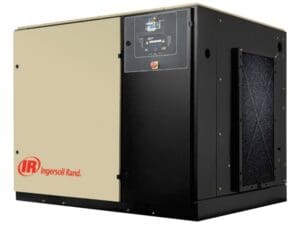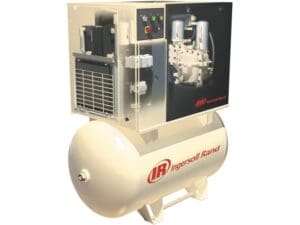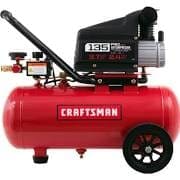How Much Do Commercial Air Compressors In 2025?
In 2025 the average cost of commercial air compressors varies widely, from about $5,000 to over $30,000. Factors influencing price include type (piston, rotary screw, centrifugal), power capacity, and features. Smaller units are less expensive, while larger, industrial-grade compressors with advanced features are at the higher end of the price range.
COMPARE QUOTESFactors that Influence The Cost of Air Compressors
 Here are 9 factors that will influence the cost of air compressors:
Here are 9 factors that will influence the cost of air compressors:
- Type of Air Compressor
- Reciprocating Compressors: Generally cheaper, suitable for small-scale operations.
- Rotary Screw Compressors: More expensive, designed for continuous use.
- Centrifugal Compressors: High cost, used in industrial applications.
- Power Capacity
- Horsepower (HP): Higher HP increases cost; tailored to application requirements.
- Cubic Feet per Minute (CFM): Higher CFM for more intensive use leads to higher costs.
- Brand and Quality
- Reputable Brands: Often more expensive due to reliability and efficiency.
- Quality of Components: Higher quality parts result in a higher price but better longevity.
- Size and Portability
- Larger Units: Typically more expensive due to higher capacity and power.
- Portable Units: Additional features for mobility can increase cost.
- Energy Efficiency
- Energy-Efficient Models: Cost more initially but save on operational costs over time.
 Noise Level
Noise Level
- Low-Noise Models: Often more expensive due to advanced technology for noise reduction.
- Additional Features and Technology
- Oil-Free Models: Higher price for cleaner air output and less maintenance.
- Control Systems: Advanced control features for efficiency and precision add to cost.
- Maintenance and Operating Costs
- Ease of Maintenance: Models designed for easier maintenance may cost more upfront.
- Operational Costs: Higher efficiency models reduce long-term operational costs.
- Warranty and Support
- Extended Warranty: Longer or more comprehensive warranties can increase initial purchase cost.
- Customer Support: Good after-sales support can factor into a higher price.
When purchasing an air compressor, it’s important to balance initial cost with operational needs, energy efficiency, and long-term maintenance costs to ensure the best value for your specific requirements.
COMPARE QUOTES
 What to Look For In an Air Compressor:
What to Look For In an Air Compressor:
When choosing a commercial air compressor, consider:
- Type: Piston (reciprocating) or rotary screw compressors are common. Piston types are generally cheaper but noisier, suitable for intermittent use. Rotary screw types are quieter and better for continuous operation.
- Power Source: Electric or gas-powered. Electric is quieter and requires less maintenance but limits mobility. Gas-powered is more portable.
- Capacity and Performance: Determine the required cubic feet per minute (CFM) and pounds per square inch (PSI) for your tools or applications.
- Size and Portability: Depending on your workspace and needs, decide whether a stationary or portable unit is suitable.
- Noise Level: Important in noise-sensitive environments.
- Durability and Build Quality: Look for robust construction, especially for demanding industrial environments.
- Energy Efficiency: More efficient compressors can reduce long-term operating costs.
- Maintenance Requirements: Understand the maintenance schedule and ease of servicing.
- Brand and Warranty: Consider the reputation of the brand and the warranty offered.
- Cost: Factor in both initial purchase price and operating costs.
Popular Air Compressor Brands: by Ingersoll-Rand, Campbell Hausfeld, Quincy, Champion, Emax Air Compressors, Schrader, Curtis, California Air Tools, Craftsman, DEWALT, Hyundai, and Industrial Air
Get Matched up With the Right Air Compressor Supplier With Up To Five Money Saving Quotes
Air Compressor is an efficient, cost-effective, and reliable way to power a variety of industrial equipment. It uses compressed air to power tools, machinery and other applications. Air compressors are available in both stationary and portable models, allowing for flexibility in how they can be used. They are ideal for any number of industrial materials handling tasks, such as moving and lifting heavy objects, spraying liquids or gases, cleaning, and more. Air compressors provide a steady stream of compressed air for efficient operation, helping to reduce downtime and maximize productivity.

Air compressors also ensure safety with their low-pressure operation, reducing the risk of accidents or damage. With regular maintenance, air compressors can last for many years, offering a reliable and cost-effective way to power industrial equipment. Air compressors are an essential tool for any industrial setting, ensuring efficient operation and keeping work running smoothly.
How to Choose the Right Air Compressor for Your Needs
When it comes to choosing an air compressor, there are a few things to consider. First and foremost, you should determine the type of applications for which you will be using the air compressor and the size of these applications. This will help inform your decision on what type of air compressor best meets your needs. Additionally, you should take into account the power and flow rate of the compressor, as well as its capacity, portability, noise levels, and cost. Taking all of these factors into consideration will ensure that you make the best choice for your needs.
Benefits of Using an Air Compressor
Air compressors provide a number of benefits in industrial settings. Here are 5 advantages:
1. Greater Efficiency: Air compressors are often used to power industrial machinery, such as drills, nail guns, jackhammers, and more. By using compressed air instead of electrical power, these machines can be operated with greater efficiency and precision. This increased level of accuracy increases productivity and reduces waste, resulting in cost savings for the business.
2. Improved Safety: Air compressors can be used to power tools that are not necessarily safe to operate with electricity, such as pneumatic saws and grinders. This reduces the risk of shocks or other electrical hazards and increases safety for employees.

3. Cleaner Operation: Because air compressors do not produce emissions or heat, they are ideal for businesses that need to operate in clean environments, such as food processing and medical facilities. Compressors also help reduce noise pollution, which is a major concern for many businesses.
4. Power Source Flexibility: Air compressors provide the flexibility of being able to use tools and machinery in locations without access to electricity. This makes them an ideal power source for construction sites, remote locations, and other off-grid areas.
5. Cost Savings: Air compressors are cheaper to operate than electrically powered machines, as they use less energy and can be powered by a variety of fuel sources, such as gas or oil. The cost savings associated with using an air compressor can add up quickly and can be a great way to reduce operating costs for any business.
Overall, air compressors are an extremely useful tool in the industrial setting and come with a number of benefits. They increase efficiency, improve safety, provide power source flexibility and reduce operating costs. These advantages make them essential for any business that needs to maximize productivity and minimize costs.
 What to Look For In an Air Compressor:
What to Look For In an Air Compressor: